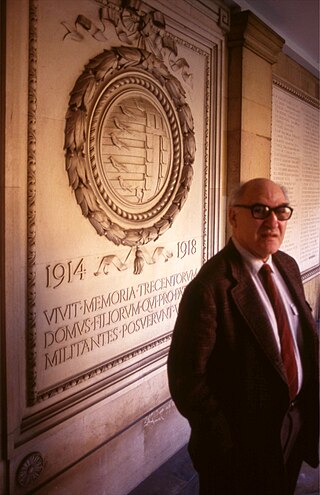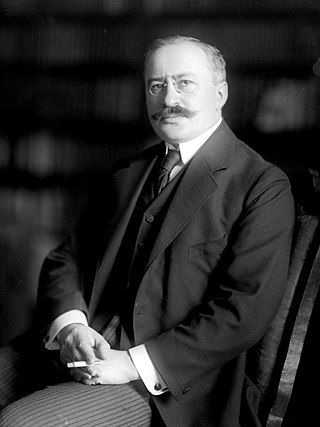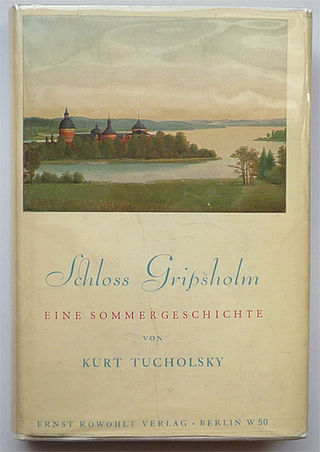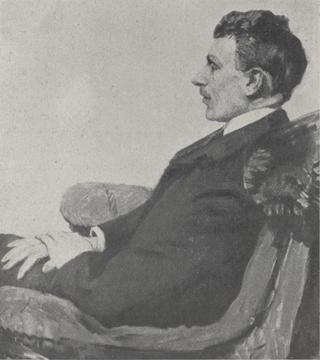
The Frankfurter Zeitung was a German-language newspaper that appeared from 1856 to 1943. It emerged from a market letter that was published in Frankfurt. In Nazi Germany, it was considered the only mass publication not completely controlled by the Propagandaministerium under Joseph Goebbels.

Gerhard "George" Lachmann Mosse was a German-American social and cultural historian, who emigrated from Nazi Germany to Great Britain and then to the United States. He was professor of history at the University of Iowa, the University of Wisconsin–Madison, and also in Israel, at the Hebrew University of Jerusalem. Best known for his studies of Nazism, he authored more than 25 books on topics as diverse as constitutional history, Protestant theology, and the history of masculinity. In 1966, he and Walter Laqueur founded The Journal of Contemporary History, which they co-edited.

The Ullstein Verlag was founded by Leopold Ullstein in 1877 at Berlin and is one of the largest publishing companies of Germany. It published newspapers like B.Z. and Berliner Morgenpost and books through its subsidiaries Ullstein Buchverlage and Propyläen.

The German language satirical magazine Ulk was printed from 1872 until 1933 by the publisher Rudolf Mosse. Its headquarters was in Berlin, Germany.
The Vossische Zeitung was a nationally known Berlin newspaper that represented the interests of the liberal middle class. It was also generally regarded as Germany's national newspaper of record. In the Berlin press it held a special role due to the fact that by way of its direct predecessors it was the oldest newspaper in the city. The name went back to Christian Friedrich Voss, who was its owner from 1751 to 1795, but Vossische Zeitung became its official name only after 1911. It ceased publication in 1934 under pressure from the Nazi state.

Die Weltbühne was a German weekly magazine for politics, art and the economy. It was founded in Berlin in 1905 as Die Schaubühne by Siegfried Jacobsohn and was originally a theater magazine only. In 1913 it began covering economic and political topics and for the next two decades was one of the leading periodicals of Germany’s political left. It was renamed to Die Weltbühne on 4 April 1918. After Jacobsohn's death in December 1926, leadership of the magazine passed to Kurt Tucholsky, who turned it over to Carl von Ossietzky in May of 1927. The Nazi Party banned the publication shortly after it came to power, and the magazine's last issue appeared on 7 March 1933. It continued from exile as Die neue Weltbühne until 1939. After the end of World War II, it appeared again under its original name in East Berlin, where it survived until 1993. The magazines Ossietzky and Das Blättchen have followed in the tradition of their famous role model.
Hans Lachmann-Mosse, till 1911Hans Lachmann, was a German publisher, director during the Weimar years of the Rudolf Mosse media empire whose titles included the Berliner Morgen-Zeitung and the Berliner Tageblatt.

Siegfried Jacobsohn was a German writer and influential theatre critic.
Gripsholm is a 2000 Swiss film directed by Xavier Koller based on the Kurt Tucholsky's novel Schloss Gripsholm and reflection into final part of his real life.
Margret Antonie Boveri was one of the best-known German journalists and writers of the post-World War II period. She was a recipient of the German Critics' Prize and the Bundesverdienstkreuz.

Ilse Frieda Gertrud Stöbe was a German journalist and anti-Nazi resistance fighter. She was born and died in Berlin.

Rudolf Olden was a German lawyer and journalist. In the Weimar period he was a well-known voice in the political debate, a vocal opponent of the Nazis, a fierce advocate of human rights and one of the first to alert the world to the treatment of Jews by the Nazis in 1934. He is the author of Hitler der Eroberer. Entlarvung einer Legende which is considered part of the German exile literature. The book was promptly banned by the Nazis. Shortly after its publication by Querido in Amsterdam, Olden's citizenship was revoked and he emigrated, together with his wife, first to the United Kingdom and then, in 1940, to the United States. On September 18 both died in the U-boat attack on the SS City of Benares in the Atlantic.
He was a German Liberal of the best sort, rather more pugnacious than the average British Liberal, because he had more to fight against.

Kurt Tucholsky was a German journalist, satirist, and writer. He also wrote under the pseudonyms Kaspar Hauser, Peter Panter, Theobald Tiger and Ignaz Wrobel.
The Theodor Wolff Prize is a German journalism prize. It has been awarded annually since 1962 in five categories, equal prizes of €6,000, by the Federal Association of German Newspaper Publishers. In addition, at irregular intervals, journalists are awarded the Theodor Wolff Prize for their life's work.

Theodor Wolff was a German writer who was influential as a journalist, critic and newspaper editor. He was born and died in Berlin. Between 1906 and 1933 he was the chief editor of the politically liberal newspaper Berliner Tageblatt.

Victor Auburtin was a German journalist and writer. His style was idiosyncratic, and he was a master of the German form of the Feuilleton genre.

Schloss Gripsholm: Eine Sommergeschichte is the title of a story (Erzählung) by Kurt Tucholsky, published in 1931. It is a love story with comic and melancholic elements, reminiscent of the author's first novel, Rheinsberg: Ein Bilderbuch für Verliebte.

Three Dancing Maidens is a nymph fountain (Nymphenbrunnen) sculpture by Walter Schott. There are three full-size versions or castings of the bronze sculpture. One is known as the Untermyer Fountain in Central Park, New York, the second one is in Antwerp’s Den Brandt Park, and the third one is in the courtyard of the Burg Schlitz castle, a grand hotel in the Mecklenburg region of northern Germany. Identification of the original sculpture created for Rudolf Mosse in 1909, and later looted by the Nazi Party is the subject of research, which appears to be leading to the version in the Burg Schlitz castle. Three-quarters scale castings, likely to be examples of the sculptor's early drafts, can be found in Germany, Austria, and Northern California.

Alfred Gold was an Austrian writer, theatre critic, journalist, art collector, and dealer.















